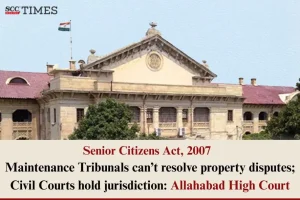Allahabad High Court: In a writ petition filed by a senior citizen, seeking a direction upon respondent 2 to ensure the protection of his life and property, citing Rule 21 of the UP Maintenance and Welfare of Parents and Senior Citizens Rules, 2014 (‘Rules, 2014’) as the respondent’s duty. The petitioner clarified that he wished to construct a gate on his property, but respondents 2 to 5 were obstructing the construction and issuing threats. The Division Bench of Arindam Sinha and Dr. Yogendra Kumar Srivastava*, JJ., held that the Maintenance Tribunal under Section 7 of the Senior Citizens Maintenance and Welfare Act, 2007 (‘Act 2007’) does not have the jurisdiction to adjudicate property ownership disputes, especially in cases involving third-party claims. The Court emphasised that such disputes must be resolved before Civil Courts, not the Maintenance Tribunal.
The Court found that the petitioner was complaining about obstruction to the construction of a gate on his property. It noted that this was not a situation where the petitioner required the discharge of a duty by the administrative authority under Rule 21 to come to his aid. The rules were enacted to implement the objectives of the Act 2007. Section 20 of the Act pertains to medical support for senior citizens, and Section 21 deals with measures for publicity, awareness, etc., for the welfare of senior citizens. The Court concluded that these provisions were not relevant to the issue at hand in the present case.
The Court emphasised that the statement of objects and reasons of the Act, 2007 clearly states that due to the decline of the joint family system, a significant number of elderly individuals are no longer cared for by their families. Consequently, many older people are forced to spend their twilight years in isolation, suffering from emotional neglect and a lack of physical and financial support. Given that aging has become a major social challenge, the Act was enacted to address these issues and to provide more effective provisions for the maintenance and welfare of parents and senior citizens, as guaranteed under the Constitution.
The Court referred to Section 4 of the Act, which entitles senior citizens, including parents who are unable to maintain themselves, to seek maintenance from their children (provided they are not minors) or, in the case of childless senior citizens, from relatives who would inherit their property. Section 5 allows a senior citizen or parent, or an authorized person or organization, to file an application for maintenance before the Maintenance Tribunal.
The Court noted that the Act of 2007 is primarily aimed at ensuring effective provisions for the maintenance and welfare of parents and senior citizens. The Maintenance Tribunals have been empowered to handle applications related to maintenance claims but are not conferred with jurisdiction to adjudicate property ownership or disputes involving third parties. Such disputes should be addressed by the Civil Courts.
The Court concluded that in the present case, the petitioner’s grievance, which pertained to alleged obstruction by a neighbor in the construction of a gate on the petitioner’s property, did not fall within the purview of the Act of 2007. The petitioner failed to demonstrate a legal right that was infringed under the Act, and therefore, the writ petition was dismissed. However, the Court clarified that the dismissal did not prevent the petitioner from seeking remedies through other legal avenues available.
[Ishak v. State of UP, 2025 SCC OnLine All 4340, decided on 16-07-2025]
*Order by: Justice Dr. Yogendra Kumar Srivastava
Advocates who appeared in this case:
Counsel for Petitioner:- Akhilesh Kumar Singh
Counsel for Respondent:- C.S.C.

